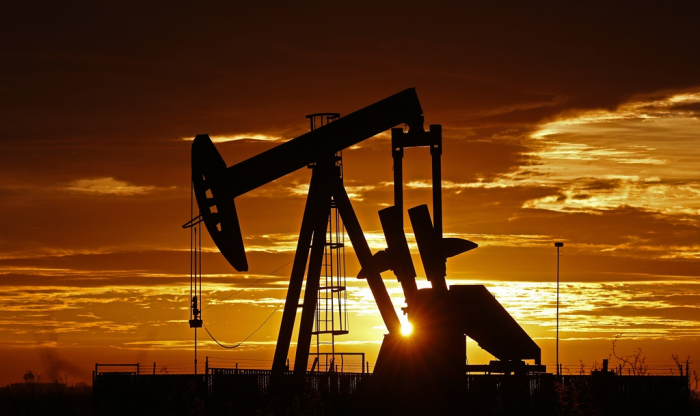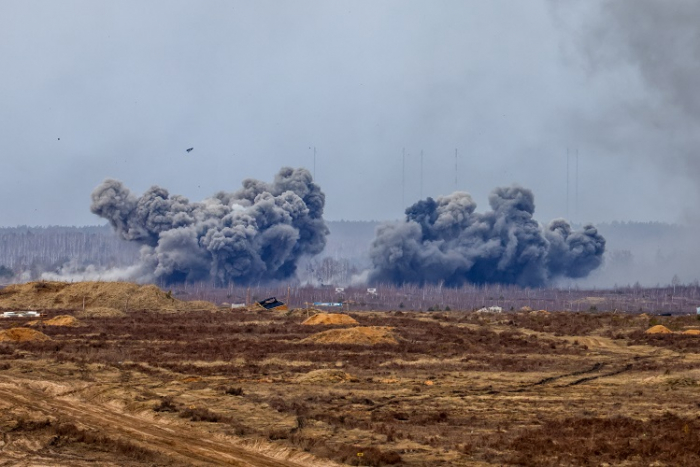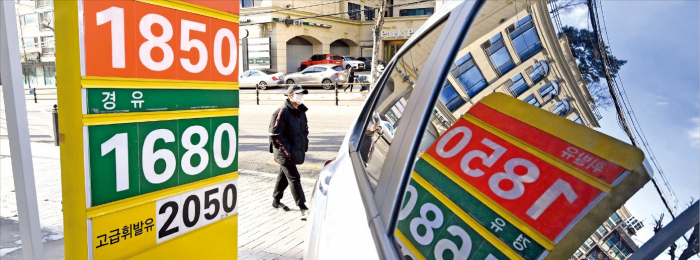Economy
Korea Inc. revises business plans as rising oil prices hit economy
Local companies may cut capex on surging oil prices as they have already been suffering from higher inflation, interest rates
By Feb 21, 2022 (Gmt+09:00)
6
Min read
Most Read
LG Chem to sell water filter business to Glenwood PE for $692 million


Kyobo Life poised to buy Japan’s SBI Group-owned savings bank


KT&G eyes overseas M&A after rejecting activist fund's offer


StockX in merger talks with Naver’s online reseller Kream


Mirae Asset to be named Korea Post’s core real estate fund operator



South Korean companies are revising their business plans for this year as soaring oil prices slam Asia’s fourth-largest economy. Inflation is expected to rise to an 11-year high, while the country is set to see the third straight month of trade deficit for the first time since the 2008-2009 global financial crisis.
A major electronics parts maker has begun revising its business plans established in November of last year with a view toward cutting capital expenditures. When the company set up its original plans oil prices were trading around $70 a barrel, about 22% less than current levels.
The company had reflected forecasts of higher crude prices in line with their plans, but the speed of the recent increases was much faster than expected, a company official said.
“We are considering cutting previously planned capital expenditures as rising oil prices have added to cost pressure,” said the official.
According to Korea Development Bank’s study based on business plans established as of end-November 2021, 3,162 domestic companies had planned to invest 186.9 trillion won ($157 billion) in capital expenditures this year, up 3.6%.
The investment, however, is predicted to decline on surging oil prices with Brent futures and US West Texas Intermediate crude at $96.78 a barrel and $95.82, respectively, last week, both at the highest levels since September 2014.
JPMorgan forecast oil prices will rise to as high as $125 per barrel in the second quarter. Crude prices had topped the $100 level only from April 2008 to August 2008, and from February 2011 to August 2014.
Lower capital expenditures are likely to lead to lower employment and weaker consumption since the country has already been suffering from rising interest rates amid higher inflation and a softer won currency.
Oil prices of $100 a barrel were expected to slash South Korea’s economic growth by 0.3 percentage point and lift consumer inflation by 1.1 percentage points, according to Hyundai Research Institute. The private institute predicted refiners, steelmakers, petrochemical producers, utility companies and airlines to suffer more from increasing costs than other industries.
TRADE DEFICIT
South Korea reported a trade deficit of more than $6.5 billion so far this year as surging crude imports overwhelmed strong exports of key products such as semiconductors.
The country logged a shortfall of $1.7 billion in the first 20 days of February, according to the Korea Customs Service on Monday, on course to post a deficit for the whole month. It reported the largest loss of $4.9 billion in January.
Its trade balance has been in red since December 2021 on surging prices of three major energy resources – crude, gas and coal. If February sees a trade deficit, it would be the first time for South Korea to report a trade deficit three months in a row since 2008 when the country posted a loss in September for the fourth straight month, according to the government data.
Last month, imports of the three energy resources more than doubled to $16 billion from $6.9 billion a year earlier.
The country is expected to post a trade deficit in the first half of this year on rising global commodity prices. Such a shortfall may slow economic growth and undermine the country’s credit ratings, some analysts warned.
The government, however, hoped for a turnaround in the trade balance from March, saying the recent shortfall is temporary.
“The trade account often deteriorates in winter when the cold weather raises imports of energy such as oil,” said a finance ministry official. “The balance is expected to improve once the weather becomes warmer even if oil prices stay high.”
But external factors including the risk of a war between Russia and Ukraine are predicted to raise oil prices further.

The Omicron variant has also been raging more than expected, disrupting the global supply chain and darkening the outlook of the country’s trade balance.
“The adverse effects from the supply chain disruption are adding to higher imports,” said Kim Sang-bong, an economics professor at Hansung University in Seoul. “It will be difficult to reverse the trend until COVID-19 subsides.”
INFLATION EXPECTED TO ACCELERATE TO 11-YEAR HIGH
Surging oil prices are expected to put further pressure on households and companies as they are predicted to push up inflation to an 11-year peak.
The Bank of Korea was known to present a prediction of around 3% for the country's annual headline inflation in 2022, which would be the highest since 2011 when consumer prices surged 4%, in a revised economic forecast to be released later this week.
Rising inflation, along with higher interest rates, usually hurts private consumption. That may dampen hopes for a full-fledged recovery in consumption on the economic reopening.
Corporate earnings are expected to deteriorate since rising oil prices are likely to increase production costs.
“Exporters did not pass on rising raw material costs to sales prices, contributing to the trade deficit,” said Kwon Hui-jin, an analyst at KB Securities. “If this situation is prolonged, it will weaken domestic purchasing power, hurting local demand and consumption.”
That could put the government’s 2022 economic growth target of 3.1% at risk. The economy expanded 4% last year with a record trade surplus of $644.5 billion last year.
CONTINGENCY PLANS
Local companies, especially airlines and petrochemical producers, stepped up efforts to come up with measures to deal with surging oil prices. Electronics manufacturers and carmakers also tried to prepare steps to cope with rising logistics costs.
But domestic firms have few options except cutting fixed expenses such as labor costs as their industry structures are sensitive to volatilities in oil prices, analysts said.
Korean Air Lines Co., the country’s top carrier, sees a loss of $30 million when the jet fuel price rises $1 a barrel. The fuel stood at $111.2 per barrel as of mid-February, up 34% from $83 two months ago, according to the International Air Transport Association.
“The industry has been buying jet fuel in advance to hedge against surging oil prices, but the sustained high oil prices inevitably deteriorated profitability,” said a domestic aviation industry source.
Manufacturers’ logistics costs are expected to rise on jumping road transportation fuel prices.
The price for diesel, the main fuel for trucks in the country, on Monday rose to an average of 1,560.7 won, the highest since Nov. 13, 2021, the state-run Korea National Oil Corp. (KNOC) data showed.
“I spent 6 million won on fuel last month, out of sales of 13 million won,” said a 44-year-old owner of a 25-ton truck, adding that the fuel cost jumped about up to 3 million won a month compared to 2020.

Higher diesel exhaust fluid (DEF) prices added to the cost burdens of truckers. The prices of the liquid used to cut pollution from diesel engines about doubled from the average of costs in 2021, although they fell from a peak hit during its shortage in October last year, industry sources said. The lack of DEF put the country’s core growth engines, including the electronics, automobiles, refining and steel sectors, at risk last year.
Such higher expenses have yet to be reflected in freight fares, but further rises in oil prices are expected to raise overall logistics costs, eventually, the sources added.
“Economic growth, along with the Ukraine crisis, is likely to keep oil prices at around $100,” said a business circle source. “South Korea needs to establish an emergency management system to brace for worsening profitability.”
Write to Kyung-Mok Noh, Kyung-Min Kang, Jin-Gyu Maeng and Kang-Ho Jang at autonomy@hankyung.com
Jongwoo Cheon edited this article.
More to Read
-
 Central bankingKorea’s record liquidity growth raises inflation, asset prices
Central bankingKorea’s record liquidity growth raises inflation, asset pricesFeb 17, 2022 (Gmt+09:00)
3 Min read -
 Supply chainDeepening diesel exhaust fluid crisis puts Korea’s key industries at risk
Supply chainDeepening diesel exhaust fluid crisis puts Korea’s key industries at riskNov 05, 2021 (Gmt+09:00)
6 Min read -

-
 EconomyKorea’s record trade deficit stirs capital outflow fears
EconomyKorea’s record trade deficit stirs capital outflow fearsFeb 03, 2022 (Gmt+09:00)
3 Min read -

-
 Central bankingBOK restores interest rates to pre-pandemic level
Central bankingBOK restores interest rates to pre-pandemic levelJan 14, 2022 (Gmt+09:00)
3 Min read
Comment 0
LOG IN


